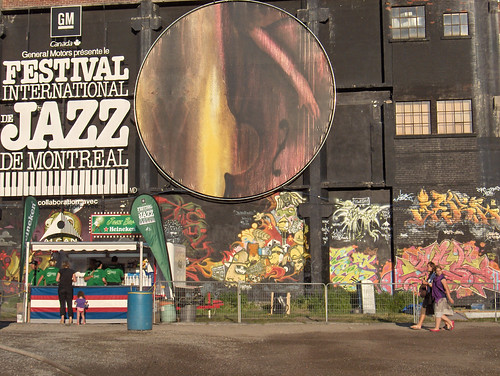Ethan's main point, for those late to the party, is this:
I believe that the tributaries that these two trios from 1996 represent are equally important considerations for the young improviser today. It hasn't really happened yet -- Joe Lovano comes closest -- but when players can eat up "Cherokee" with Jeff Watts and create free harmony with Barre Phillips at an equal level, that will really be something.Ironically enough, both Dave and Ethan are too close to their own music and possibly too humble to state it, so I will: they are embodiments of authenticity in both streams. I mentioned this in my forthcoming review of TBP with guitarist Mike Stern at the Festival, but it was really fascinating to hear them go beyond their usual setting and work with new musicians and new forms. Ethan mentioned during the interview of having an identity crisis in soundcheck, of being principally a member of TBP or principally playing with Mike Stern. I'd argue he split the difference admirably. My respect and awe for Dave escalated tremendously after his appearance at the on-campus pub jam session at Banff, blowing the shit out of bebop changes and on sax faculty Mike Zilber's Coltrane-matrix-laden tunes on the weekly concert.
Dave is right that a musician bases their sound on choices of context, but his catalogue is proof that choosing a context can vary from project to project (and ideally should). What I think both of them try get at is that many artists choose a context in exclusivity, and throw other practices out with the bathwater. In the dichotomy Ethan presents, there's often a hesitancy among younger musicians delving into the other "stream" (for lack of a better term here), and in the surge of institutionalized jazz education, the free-harmony side of the spectrum gets short shrift. In practice, I find more and more musicians addressing free music and composition-based music equally, in interesting ways. There are still those who choose one over the other.
One musician who is an astonishing practitioner of both is Toronto guitarist Reg Schwager. When I was growing up in Toronto, Reg was the straight-ahead player par excellence, with a sweet, warm tone and heavy swing. He toured with George Shearing for a while (and still might, I don't know.) Then, through Panpot, a disc arrived in the mail: Québécois saxophonist François Carrier's entirely improvised Noh, with drummer/percussionists John Heward and Michel Lambert (another player equally at home swinging like mad or abstractly contributing to new musical conversations), and Reg. As I mentioned in my review of Ribot, my knowledge of the avant-guitar spectrum is limited at best, but Reg fit amazingly well with the rest of the musicians. Unlike some other, more "energy music" style releases I've reviewed, Reg and the others are listening as much as they are playing - and that seems to be the key skill that's often missing in a player's formation. We all study how to play, but rarely do we study how to listen. (Turns out he's also an aficionado of Brazilian music.)
There's any number of musicians who are equally at home playing free or playing tunes (many of whom appear on Ethan's post): John Hollenbeck, Jason Moran, Benoit Delbecq, Ben Monder, Vijay Iyer, and locally, fellow Banff alums pianist Marianne Trudel and bassist Miles Perkin. In my own musical life I've found it necessary to be involved with a number of disparate musical genres at any given time - writing for big band one day, playing free in a William Parker workshop the next, and gigs with R&B and jambands in the offing. When any one of those elements is missing from my schedule, I feel somewhat incomplete.
NB: Banff marked the first time I had ever played free with any sort of consistency or duration. While I may not be the next rising force in the actuelle scene, free improvisation has definitely informed how I approach the rest of my music and figured heavily in the Indigone Trio + Strings project.


